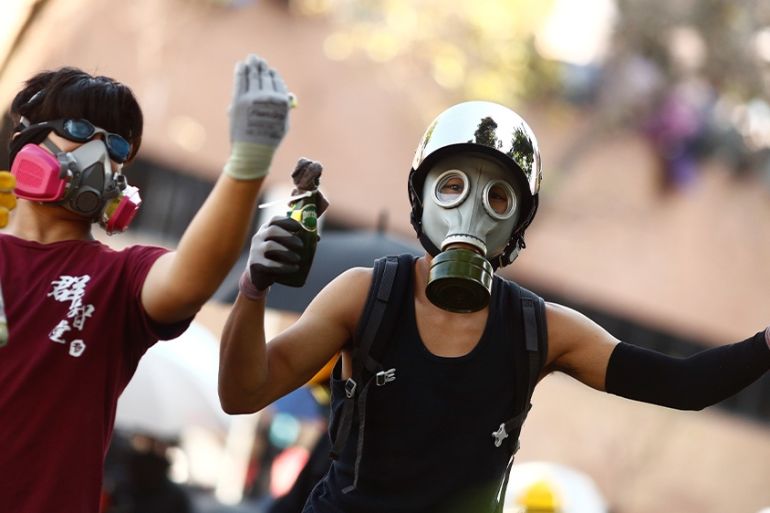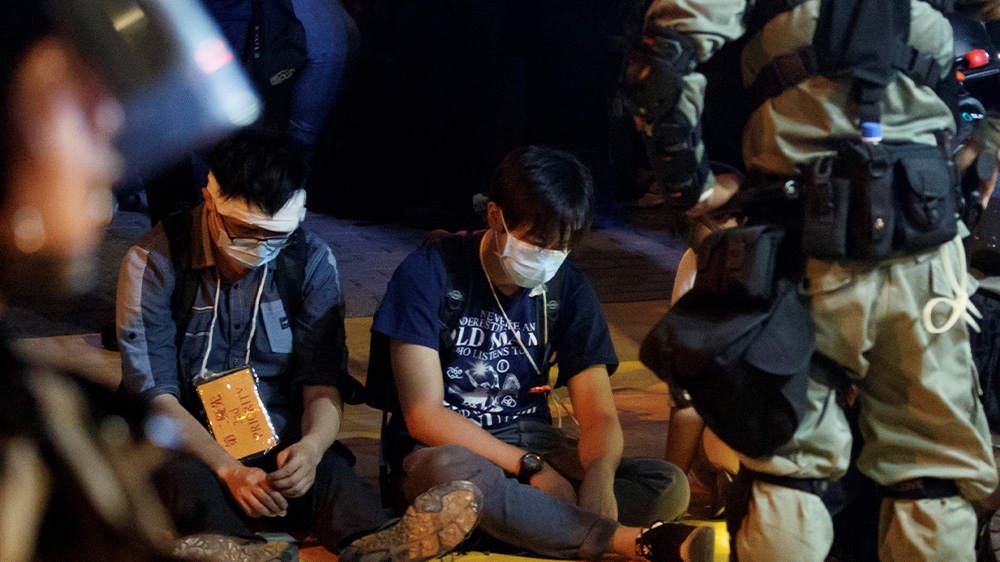China says its courts trump Hong Kong’s on face mask ruling
Chinese legislature condemns High Court decision to overturn law on face masks ban amid escalating protests in city.

China’s top legislature has insisted Hong Kong courts had no power to rule on the constitutionality of legislation under the city’s Basic Law, as it condemned a decision by the high court to overturn a ban on face masks worn by pro-democracy protesters.
The statement on Tuesday came a day after the high court ruled that the face mask ban – introduced through colonial-era emergency laws – was unconstitutional.
Keep reading
list of 2 itemsHong Kong charges pro-democracy legislators
The statement could further fan the flames in Hong Kong after months of violent protests over concerns that Beijing is eating away at the city’s autonomy.
“Whether the laws of the Hong Kong Special Administrative Region comply with the Basic Law of Hong Kong can only be judged and decided by the Standing Committee of the National People’s Congress,” Yan Tanwei, a spokesman for the Legislative Affairs Commission of the Standing Committee of the National People’s Congress, said in a statement.
“No other authority has the right to make judgments and decisions,” he added.
Yan also indicated that the legislature might take some form of action.
“We are considering the relevant opinions and suggestions put forward by some NPC deputies,” he said, without elaborating.

Protests started in June with rallies that brought hundreds of thousands of people onto the streets in a largely peaceful call for the withdrawal of a now-withdrawn bill that would have allowed suspected criminals to be extradited to mainland China for trial.
They have since evolved into a series of demands for greater democracy and freedoms as well as an independent inquiry into alleged police brutality. Protesters worry China is encroaching on the freedoms given to Hong Kong when the United Kingdom returned the territory to China under what was known as “one country, two systems” in 1997.
Al Jazeera’s Andrew Thomas, reporting from Beijing, said the statement from the legislature was rare and a further indication of how seriously China viewed the situation in the city.
“There is an irony here,” he said. “Beijing is saying only it has the power to interpret the constitution not the [Hong Kong] courts. They are proving what the protesters have been saying ever since they first came out onto the streets – that is that the whole idea of ‘one country, two systems” is essentially a sham and that the power rests solely with Beijing.”
China has repeatedly warned that it would not allow the city to spiral into total chaos, heightening concerns that Beijing might deploy troops or other security forces to quell the unrest.
“The Hong Kong government is trying very hard to put the situation under control,” China’s ambassador to the UK, Liu Xiaoming, said on Monday.
“But if the situation becomes uncontrollable, the central government would certainly not sit on our hands and watch. We have enough resolution and power to end the unrest.”
Three bottom lines: China will not tolerate, one, undermining of national sovereignty and security, two, challenging the authority of Central Government or Basic Law, and three, using #HongKong for infiltration or sabotage against the mainland.
— Liu Xiaoming (@AmbLiuXiaoMing) November 18, 2019
China has continued to back Chief Executive Carrie Lam and the city’s police force, which has faced off with protesters in increasingly violent clashes.
This week police laid siege to a university campus where protesters, some armed with bows and homemade catapults to fire bricks, have been holed up for almost three days.
Dozens escaped the Hong Kong Polytechnic University (PolyU) late on Monday by abseiling from a bridge to waiting motorbikes. About 100 people remain inside, according to police.
A young Japanese man was arrested near the campus on Sunday, Chief Cabinet Secretary Yoshihde Suga confirmed without discussing the nature of the arrest.
Protesters had been using masks to hide their identities in public. The proposal was widely criticised by supporters of the anti-government movement, who saw it as a risk to demonstrators.
Hong Kong’s High Court ruled on Monday that colonial-era emergency laws, which were revived to justify the mask ban, were “incompatible with the Basic Law”, the mini-constitution under which Hong Kong was returned to China.